Analysis of Legislation, Ethics, and Regulations in Travel and Tourism
VerifiedAdded on 2020/01/28
|18
|5888
|1233
Report
AI Summary
This report provides a comprehensive overview of the legal and ethical frameworks governing the travel and tourism industry. It begins by exploring the legal and regulatory frameworks, including relevant acts and regulations related to tourism, transport (air, surface, and sea), and consumer protection. The report then delves into health and safety standards, security parameters, and the implications of related legislations. It examines consumer protection legislations, contract laws, and the rights of customers within the travel and tourism sector. Furthermore, the report analyzes the role of business ethics, identifies ethical dilemmas faced by corporations, and evaluates corporate social responsibility (CSR) activities. The report covers topics such as the Tourism Act 1969, Transport Act, Package Travel & Tour Regulations, and the Equality Act 2010, offering a thorough examination of the legal and ethical considerations within the industry. The report concludes by summarizing the key findings and emphasizing the importance of ethical practices and compliance with relevant legislations for sustainable development of the travel and tourism sector.
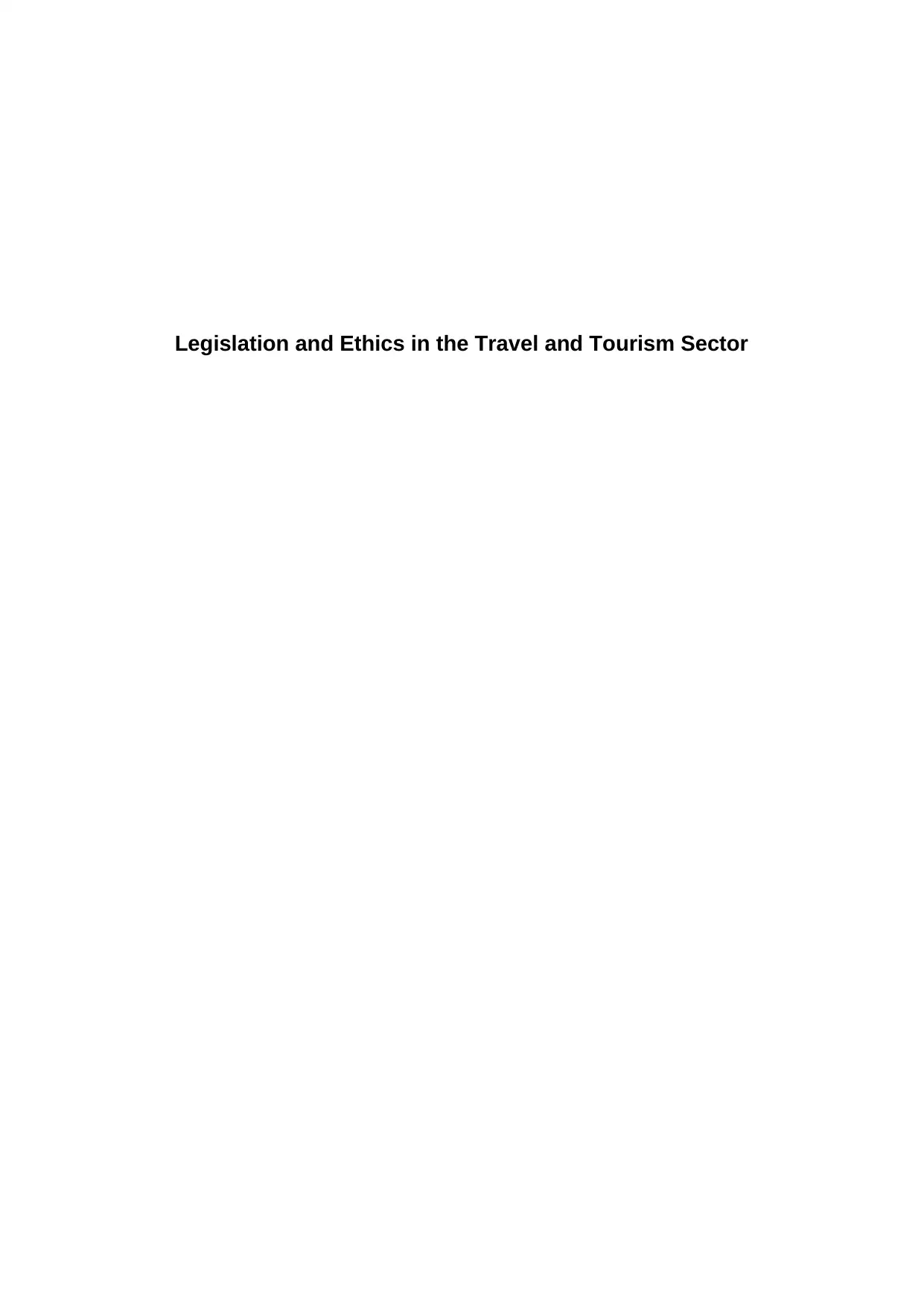
Legislation and Ethics in the Travel and Tourism Sector
Paraphrase This Document
Need a fresh take? Get an instant paraphrase of this document with our AI Paraphraser
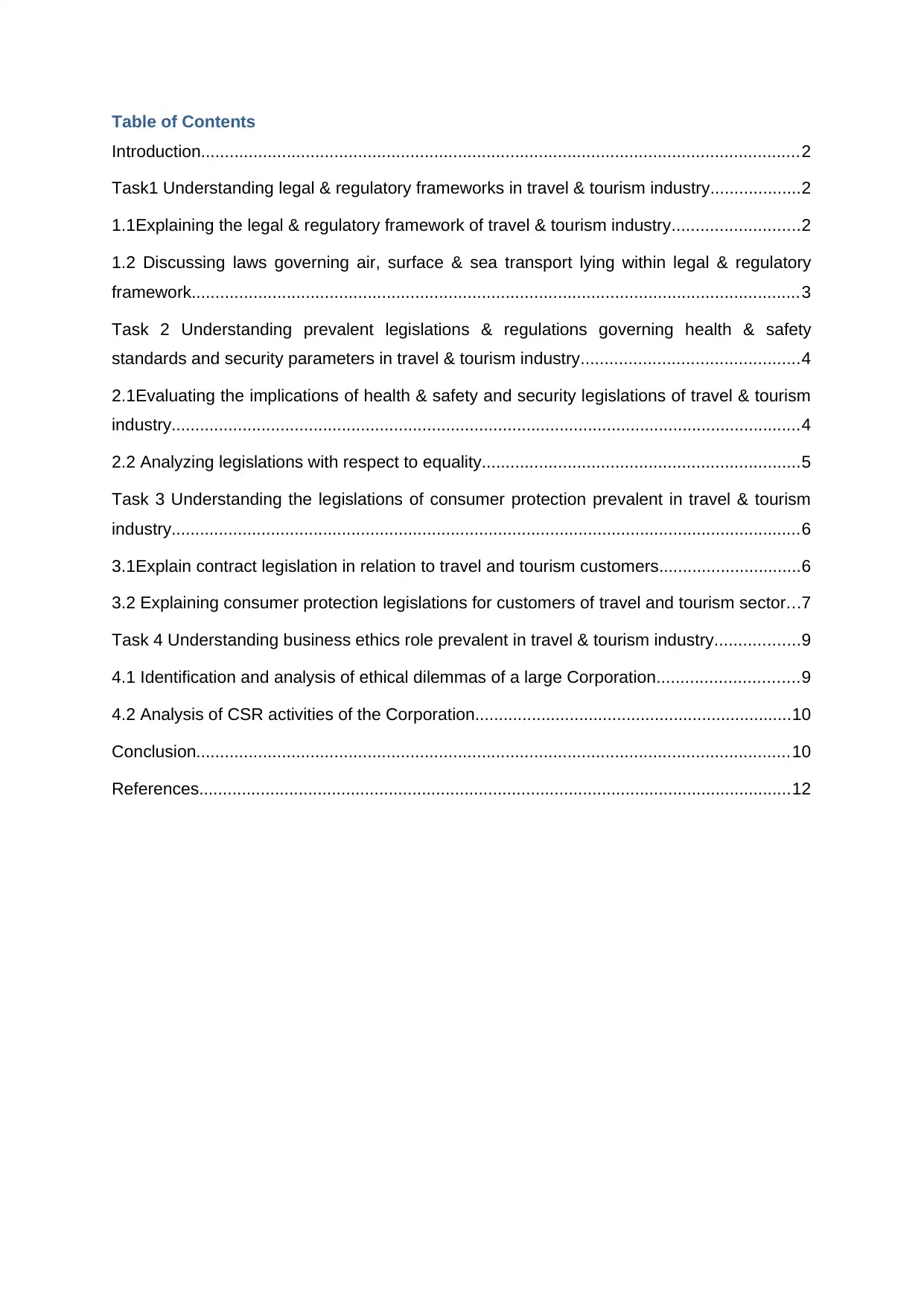
Table of Contents
Introduction..............................................................................................................................2
Task1 Understanding legal & regulatory frameworks in travel & tourism industry...................2
1.1Explaining the legal & regulatory framework of travel & tourism industry...........................2
1.2 Discussing laws governing air, surface & sea transport lying within legal & regulatory
framework................................................................................................................................3
Task 2 Understanding prevalent legislations & regulations governing health & safety
standards and security parameters in travel & tourism industry..............................................4
2.1Evaluating the implications of health & safety and security legislations of travel & tourism
industry.....................................................................................................................................4
2.2 Analyzing legislations with respect to equality...................................................................5
Task 3 Understanding the legislations of consumer protection prevalent in travel & tourism
industry.....................................................................................................................................6
3.1Explain contract legislation in relation to travel and tourism customers..............................6
3.2 Explaining consumer protection legislations for customers of travel and tourism sector...7
Task 4 Understanding business ethics role prevalent in travel & tourism industry..................9
4.1 Identification and analysis of ethical dilemmas of a large Corporation..............................9
4.2 Analysis of CSR activities of the Corporation...................................................................10
Conclusion.............................................................................................................................10
References.............................................................................................................................12
Introduction..............................................................................................................................2
Task1 Understanding legal & regulatory frameworks in travel & tourism industry...................2
1.1Explaining the legal & regulatory framework of travel & tourism industry...........................2
1.2 Discussing laws governing air, surface & sea transport lying within legal & regulatory
framework................................................................................................................................3
Task 2 Understanding prevalent legislations & regulations governing health & safety
standards and security parameters in travel & tourism industry..............................................4
2.1Evaluating the implications of health & safety and security legislations of travel & tourism
industry.....................................................................................................................................4
2.2 Analyzing legislations with respect to equality...................................................................5
Task 3 Understanding the legislations of consumer protection prevalent in travel & tourism
industry.....................................................................................................................................6
3.1Explain contract legislation in relation to travel and tourism customers..............................6
3.2 Explaining consumer protection legislations for customers of travel and tourism sector...7
Task 4 Understanding business ethics role prevalent in travel & tourism industry..................9
4.1 Identification and analysis of ethical dilemmas of a large Corporation..............................9
4.2 Analysis of CSR activities of the Corporation...................................................................10
Conclusion.............................................................................................................................10
References.............................................................................................................................12
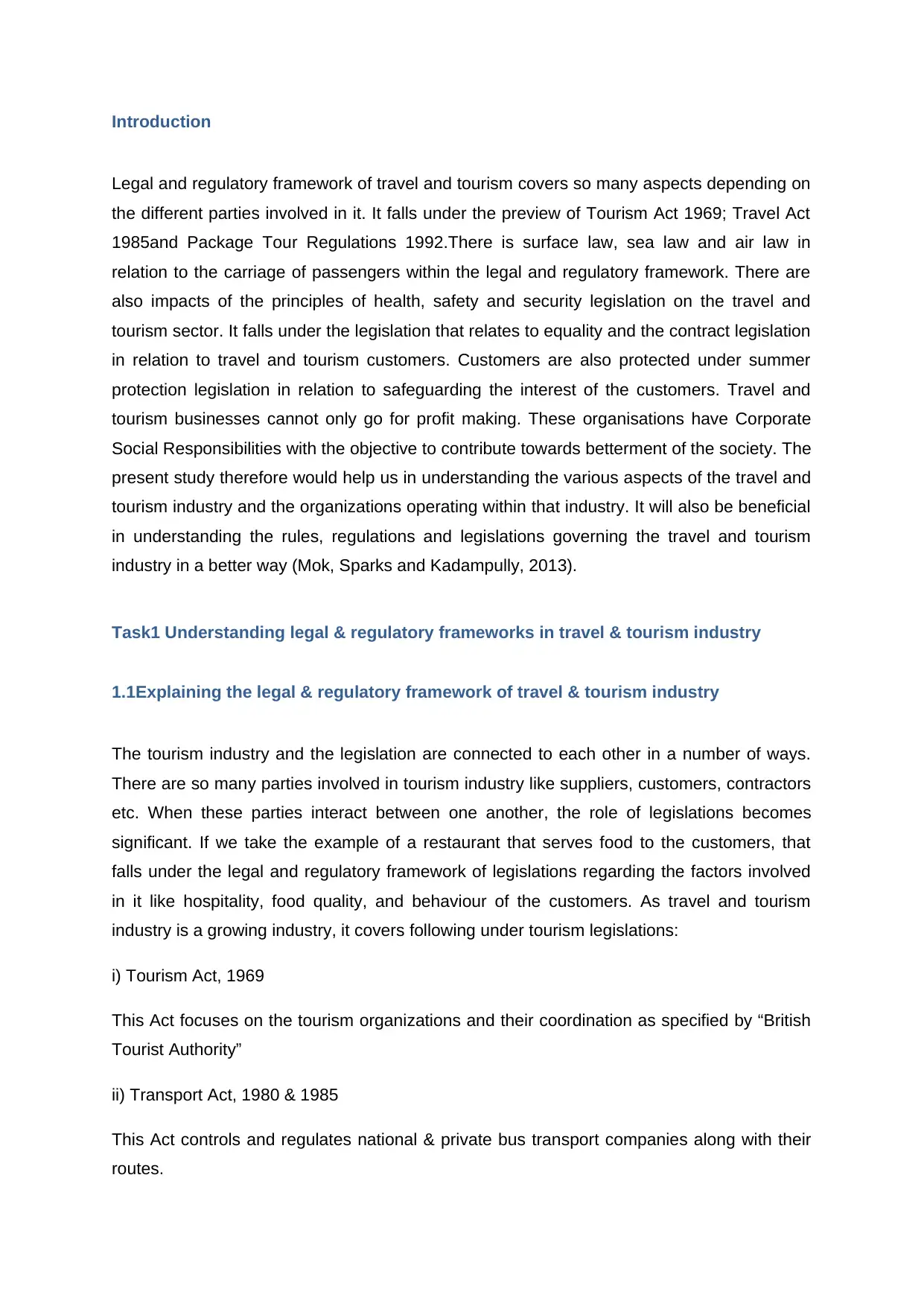
Introduction
Legal and regulatory framework of travel and tourism covers so many aspects depending on
the different parties involved in it. It falls under the preview of Tourism Act 1969; Travel Act
1985and Package Tour Regulations 1992.There is surface law, sea law and air law in
relation to the carriage of passengers within the legal and regulatory framework. There are
also impacts of the principles of health, safety and security legislation on the travel and
tourism sector. It falls under the legislation that relates to equality and the contract legislation
in relation to travel and tourism customers. Customers are also protected under summer
protection legislation in relation to safeguarding the interest of the customers. Travel and
tourism businesses cannot only go for profit making. These organisations have Corporate
Social Responsibilities with the objective to contribute towards betterment of the society. The
present study therefore would help us in understanding the various aspects of the travel and
tourism industry and the organizations operating within that industry. It will also be beneficial
in understanding the rules, regulations and legislations governing the travel and tourism
industry in a better way (Mok, Sparks and Kadampully, 2013).
Task1 Understanding legal & regulatory frameworks in travel & tourism industry
1.1Explaining the legal & regulatory framework of travel & tourism industry
The tourism industry and the legislation are connected to each other in a number of ways.
There are so many parties involved in tourism industry like suppliers, customers, contractors
etc. When these parties interact between one another, the role of legislations becomes
significant. If we take the example of a restaurant that serves food to the customers, that
falls under the legal and regulatory framework of legislations regarding the factors involved
in it like hospitality, food quality, and behaviour of the customers. As travel and tourism
industry is a growing industry, it covers following under tourism legislations:
i) Tourism Act, 1969
This Act focuses on the tourism organizations and their coordination as specified by “British
Tourist Authority”
ii) Transport Act, 1980 & 1985
This Act controls and regulates national & private bus transport companies along with their
routes.
Legal and regulatory framework of travel and tourism covers so many aspects depending on
the different parties involved in it. It falls under the preview of Tourism Act 1969; Travel Act
1985and Package Tour Regulations 1992.There is surface law, sea law and air law in
relation to the carriage of passengers within the legal and regulatory framework. There are
also impacts of the principles of health, safety and security legislation on the travel and
tourism sector. It falls under the legislation that relates to equality and the contract legislation
in relation to travel and tourism customers. Customers are also protected under summer
protection legislation in relation to safeguarding the interest of the customers. Travel and
tourism businesses cannot only go for profit making. These organisations have Corporate
Social Responsibilities with the objective to contribute towards betterment of the society. The
present study therefore would help us in understanding the various aspects of the travel and
tourism industry and the organizations operating within that industry. It will also be beneficial
in understanding the rules, regulations and legislations governing the travel and tourism
industry in a better way (Mok, Sparks and Kadampully, 2013).
Task1 Understanding legal & regulatory frameworks in travel & tourism industry
1.1Explaining the legal & regulatory framework of travel & tourism industry
The tourism industry and the legislation are connected to each other in a number of ways.
There are so many parties involved in tourism industry like suppliers, customers, contractors
etc. When these parties interact between one another, the role of legislations becomes
significant. If we take the example of a restaurant that serves food to the customers, that
falls under the legal and regulatory framework of legislations regarding the factors involved
in it like hospitality, food quality, and behaviour of the customers. As travel and tourism
industry is a growing industry, it covers following under tourism legislations:
i) Tourism Act, 1969
This Act focuses on the tourism organizations and their coordination as specified by “British
Tourist Authority”
ii) Transport Act, 1980 & 1985
This Act controls and regulates national & private bus transport companies along with their
routes.
⊘ This is a preview!⊘
Do you want full access?
Subscribe today to unlock all pages.

Trusted by 1+ million students worldwide
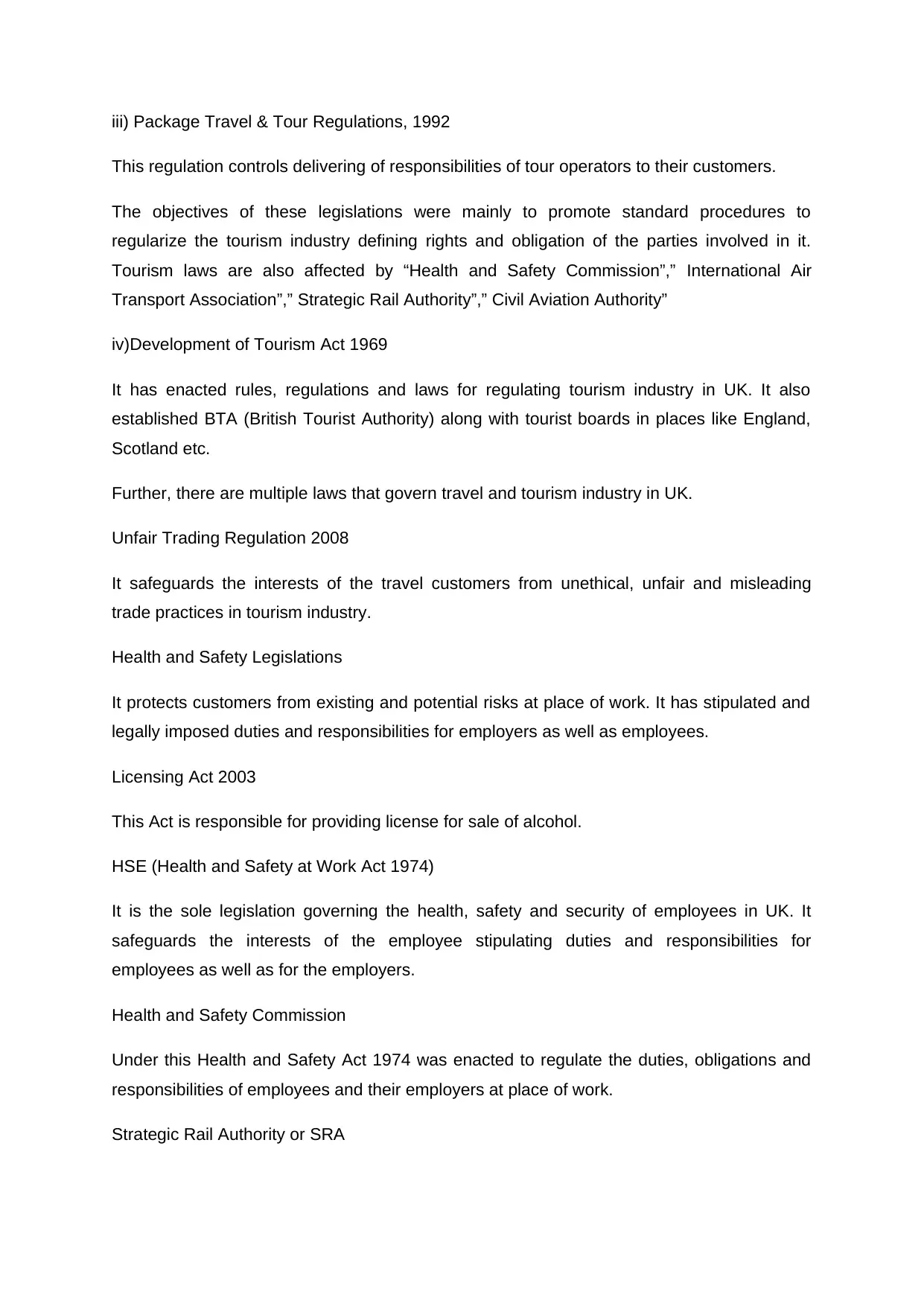
iii) Package Travel & Tour Regulations, 1992
This regulation controls delivering of responsibilities of tour operators to their customers.
The objectives of these legislations were mainly to promote standard procedures to
regularize the tourism industry defining rights and obligation of the parties involved in it.
Tourism laws are also affected by “Health and Safety Commission”,” International Air
Transport Association”,” Strategic Rail Authority”,” Civil Aviation Authority”
iv)Development of Tourism Act 1969
It has enacted rules, regulations and laws for regulating tourism industry in UK. It also
established BTA (British Tourist Authority) along with tourist boards in places like England,
Scotland etc.
Further, there are multiple laws that govern travel and tourism industry in UK.
Unfair Trading Regulation 2008
It safeguards the interests of the travel customers from unethical, unfair and misleading
trade practices in tourism industry.
Health and Safety Legislations
It protects customers from existing and potential risks at place of work. It has stipulated and
legally imposed duties and responsibilities for employers as well as employees.
Licensing Act 2003
This Act is responsible for providing license for sale of alcohol.
HSE (Health and Safety at Work Act 1974)
It is the sole legislation governing the health, safety and security of employees in UK. It
safeguards the interests of the employee stipulating duties and responsibilities for
employees as well as for the employers.
Health and Safety Commission
Under this Health and Safety Act 1974 was enacted to regulate the duties, obligations and
responsibilities of employees and their employers at place of work.
Strategic Rail Authority or SRA
This regulation controls delivering of responsibilities of tour operators to their customers.
The objectives of these legislations were mainly to promote standard procedures to
regularize the tourism industry defining rights and obligation of the parties involved in it.
Tourism laws are also affected by “Health and Safety Commission”,” International Air
Transport Association”,” Strategic Rail Authority”,” Civil Aviation Authority”
iv)Development of Tourism Act 1969
It has enacted rules, regulations and laws for regulating tourism industry in UK. It also
established BTA (British Tourist Authority) along with tourist boards in places like England,
Scotland etc.
Further, there are multiple laws that govern travel and tourism industry in UK.
Unfair Trading Regulation 2008
It safeguards the interests of the travel customers from unethical, unfair and misleading
trade practices in tourism industry.
Health and Safety Legislations
It protects customers from existing and potential risks at place of work. It has stipulated and
legally imposed duties and responsibilities for employers as well as employees.
Licensing Act 2003
This Act is responsible for providing license for sale of alcohol.
HSE (Health and Safety at Work Act 1974)
It is the sole legislation governing the health, safety and security of employees in UK. It
safeguards the interests of the employee stipulating duties and responsibilities for
employees as well as for the employers.
Health and Safety Commission
Under this Health and Safety Act 1974 was enacted to regulate the duties, obligations and
responsibilities of employees and their employers at place of work.
Strategic Rail Authority or SRA
Paraphrase This Document
Need a fresh take? Get an instant paraphrase of this document with our AI Paraphraser
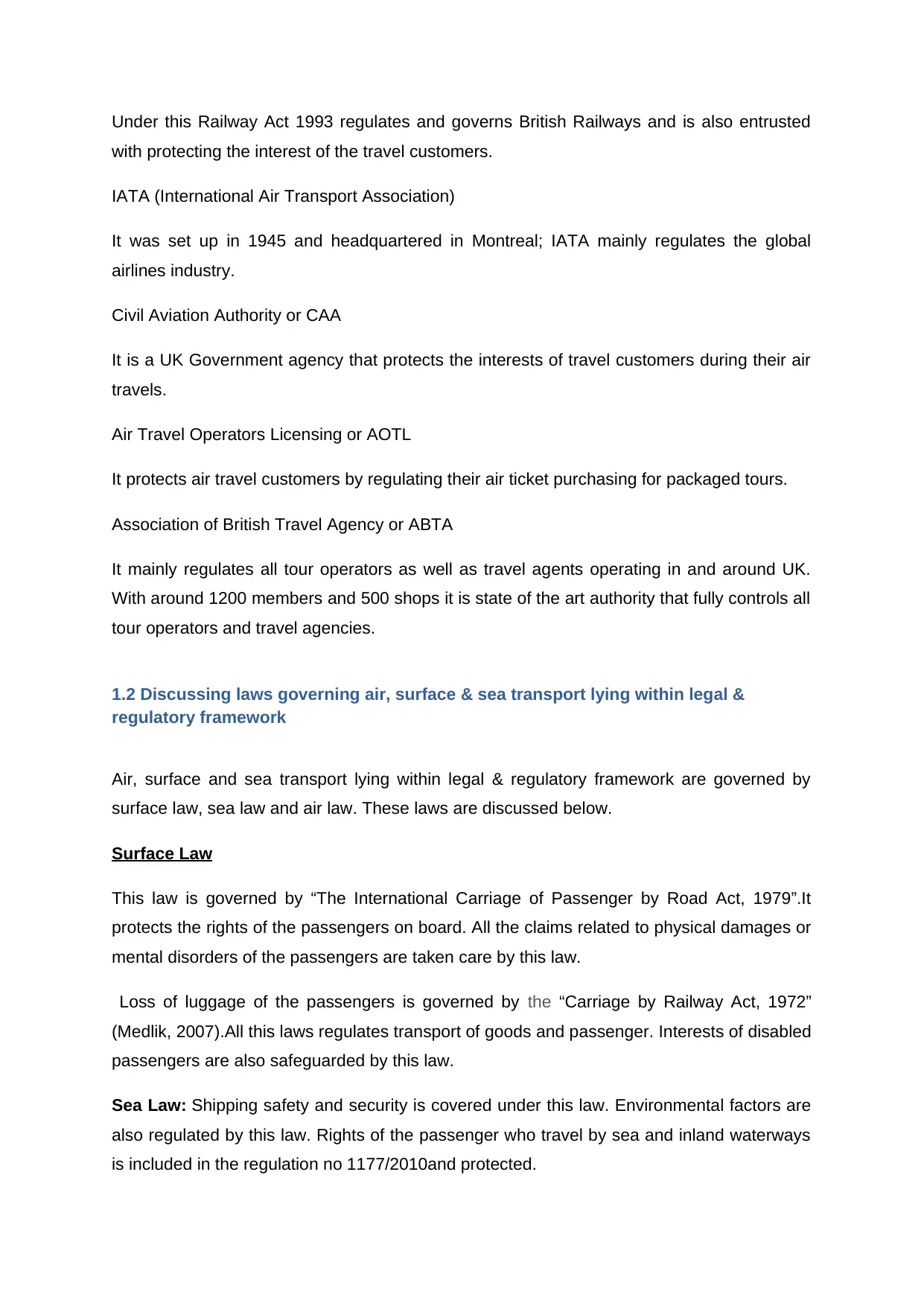
Under this Railway Act 1993 regulates and governs British Railways and is also entrusted
with protecting the interest of the travel customers.
IATA (International Air Transport Association)
It was set up in 1945 and headquartered in Montreal; IATA mainly regulates the global
airlines industry.
Civil Aviation Authority or CAA
It is a UK Government agency that protects the interests of travel customers during their air
travels.
Air Travel Operators Licensing or AOTL
It protects air travel customers by regulating their air ticket purchasing for packaged tours.
Association of British Travel Agency or ABTA
It mainly regulates all tour operators as well as travel agents operating in and around UK.
With around 1200 members and 500 shops it is state of the art authority that fully controls all
tour operators and travel agencies.
1.2 Discussing laws governing air, surface & sea transport lying within legal &
regulatory framework
Air, surface and sea transport lying within legal & regulatory framework are governed by
surface law, sea law and air law. These laws are discussed below.
Surface Law
This law is governed by “The International Carriage of Passenger by Road Act, 1979”.It
protects the rights of the passengers on board. All the claims related to physical damages or
mental disorders of the passengers are taken care by this law.
Loss of luggage of the passengers is governed by the “Carriage by Railway Act, 1972”
(Medlik, 2007).All this laws regulates transport of goods and passenger. Interests of disabled
passengers are also safeguarded by this law.
Sea Law: Shipping safety and security is covered under this law. Environmental factors are
also regulated by this law. Rights of the passenger who travel by sea and inland waterways
is included in the regulation no 1177/2010and protected.
with protecting the interest of the travel customers.
IATA (International Air Transport Association)
It was set up in 1945 and headquartered in Montreal; IATA mainly regulates the global
airlines industry.
Civil Aviation Authority or CAA
It is a UK Government agency that protects the interests of travel customers during their air
travels.
Air Travel Operators Licensing or AOTL
It protects air travel customers by regulating their air ticket purchasing for packaged tours.
Association of British Travel Agency or ABTA
It mainly regulates all tour operators as well as travel agents operating in and around UK.
With around 1200 members and 500 shops it is state of the art authority that fully controls all
tour operators and travel agencies.
1.2 Discussing laws governing air, surface & sea transport lying within legal &
regulatory framework
Air, surface and sea transport lying within legal & regulatory framework are governed by
surface law, sea law and air law. These laws are discussed below.
Surface Law
This law is governed by “The International Carriage of Passenger by Road Act, 1979”.It
protects the rights of the passengers on board. All the claims related to physical damages or
mental disorders of the passengers are taken care by this law.
Loss of luggage of the passengers is governed by the “Carriage by Railway Act, 1972”
(Medlik, 2007).All this laws regulates transport of goods and passenger. Interests of disabled
passengers are also safeguarded by this law.
Sea Law: Shipping safety and security is covered under this law. Environmental factors are
also regulated by this law. Rights of the passenger who travel by sea and inland waterways
is included in the regulation no 1177/2010and protected.
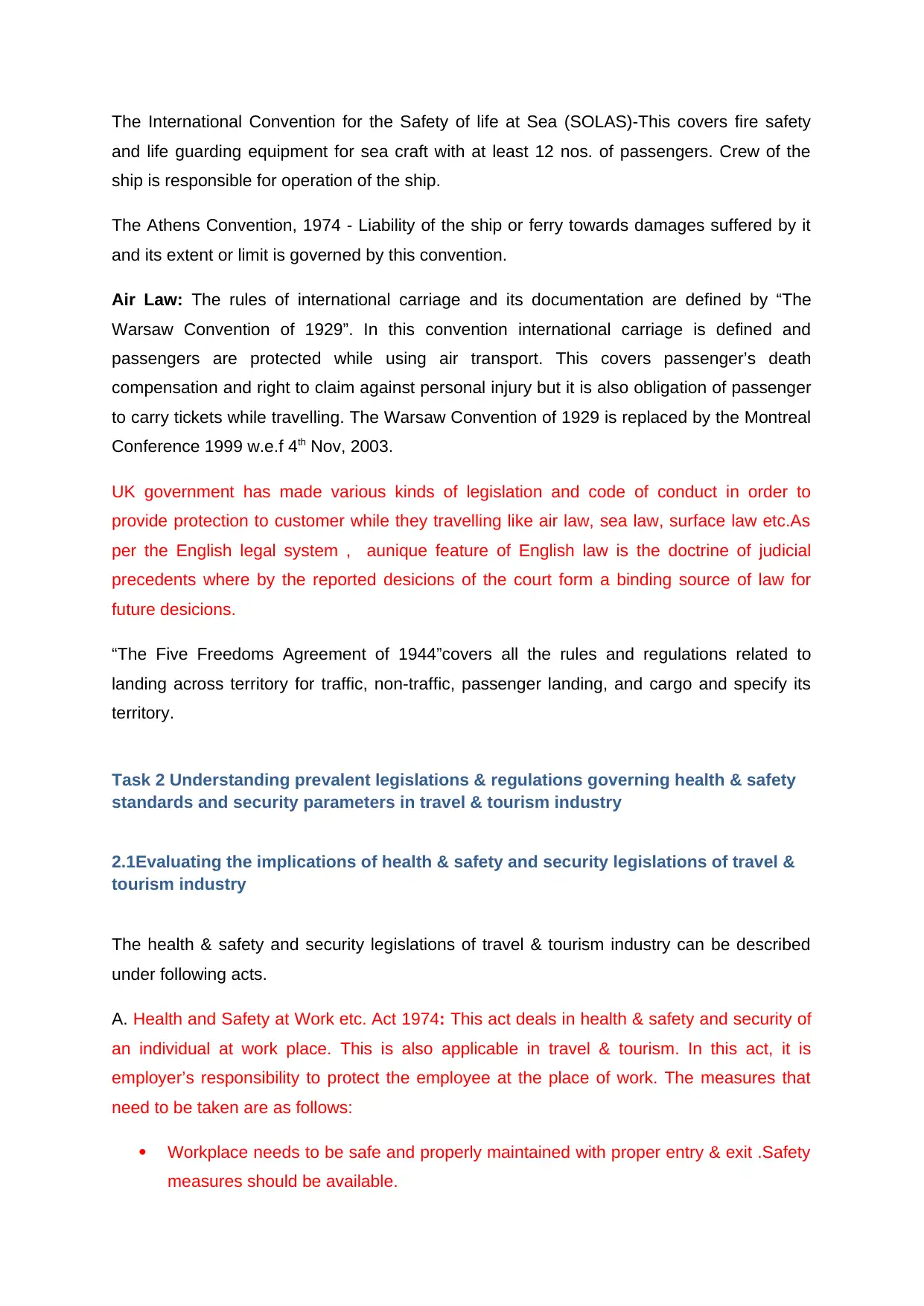
The International Convention for the Safety of life at Sea (SOLAS)-This covers fire safety
and life guarding equipment for sea craft with at least 12 nos. of passengers. Crew of the
ship is responsible for operation of the ship.
The Athens Convention, 1974 - Liability of the ship or ferry towards damages suffered by it
and its extent or limit is governed by this convention.
Air Law: The rules of international carriage and its documentation are defined by “The
Warsaw Convention of 1929”. In this convention international carriage is defined and
passengers are protected while using air transport. This covers passenger’s death
compensation and right to claim against personal injury but it is also obligation of passenger
to carry tickets while travelling. The Warsaw Convention of 1929 is replaced by the Montreal
Conference 1999 w.e.f 4th Nov, 2003.
UK government has made various kinds of legislation and code of conduct in order to
provide protection to customer while they travelling like air law, sea law, surface law etc.As
per the English legal system , aunique feature of English law is the doctrine of judicial
precedents where by the reported desicions of the court form a binding source of law for
future desicions.
“The Five Freedoms Agreement of 1944”covers all the rules and regulations related to
landing across territory for traffic, non-traffic, passenger landing, and cargo and specify its
territory.
Task 2 Understanding prevalent legislations & regulations governing health & safety
standards and security parameters in travel & tourism industry
2.1Evaluating the implications of health & safety and security legislations of travel &
tourism industry
The health & safety and security legislations of travel & tourism industry can be described
under following acts.
A. Health and Safety at Work etc. Act 1974: This act deals in health & safety and security of
an individual at work place. This is also applicable in travel & tourism. In this act, it is
employer’s responsibility to protect the employee at the place of work. The measures that
need to be taken are as follows:
Workplace needs to be safe and properly maintained with proper entry & exit .Safety
measures should be available.
and life guarding equipment for sea craft with at least 12 nos. of passengers. Crew of the
ship is responsible for operation of the ship.
The Athens Convention, 1974 - Liability of the ship or ferry towards damages suffered by it
and its extent or limit is governed by this convention.
Air Law: The rules of international carriage and its documentation are defined by “The
Warsaw Convention of 1929”. In this convention international carriage is defined and
passengers are protected while using air transport. This covers passenger’s death
compensation and right to claim against personal injury but it is also obligation of passenger
to carry tickets while travelling. The Warsaw Convention of 1929 is replaced by the Montreal
Conference 1999 w.e.f 4th Nov, 2003.
UK government has made various kinds of legislation and code of conduct in order to
provide protection to customer while they travelling like air law, sea law, surface law etc.As
per the English legal system , aunique feature of English law is the doctrine of judicial
precedents where by the reported desicions of the court form a binding source of law for
future desicions.
“The Five Freedoms Agreement of 1944”covers all the rules and regulations related to
landing across territory for traffic, non-traffic, passenger landing, and cargo and specify its
territory.
Task 2 Understanding prevalent legislations & regulations governing health & safety
standards and security parameters in travel & tourism industry
2.1Evaluating the implications of health & safety and security legislations of travel &
tourism industry
The health & safety and security legislations of travel & tourism industry can be described
under following acts.
A. Health and Safety at Work etc. Act 1974: This act deals in health & safety and security of
an individual at work place. This is also applicable in travel & tourism. In this act, it is
employer’s responsibility to protect the employee at the place of work. The measures that
need to be taken are as follows:
Workplace needs to be safe and properly maintained with proper entry & exit .Safety
measures should be available.
⊘ This is a preview!⊘
Do you want full access?
Subscribe today to unlock all pages.

Trusted by 1+ million students worldwide
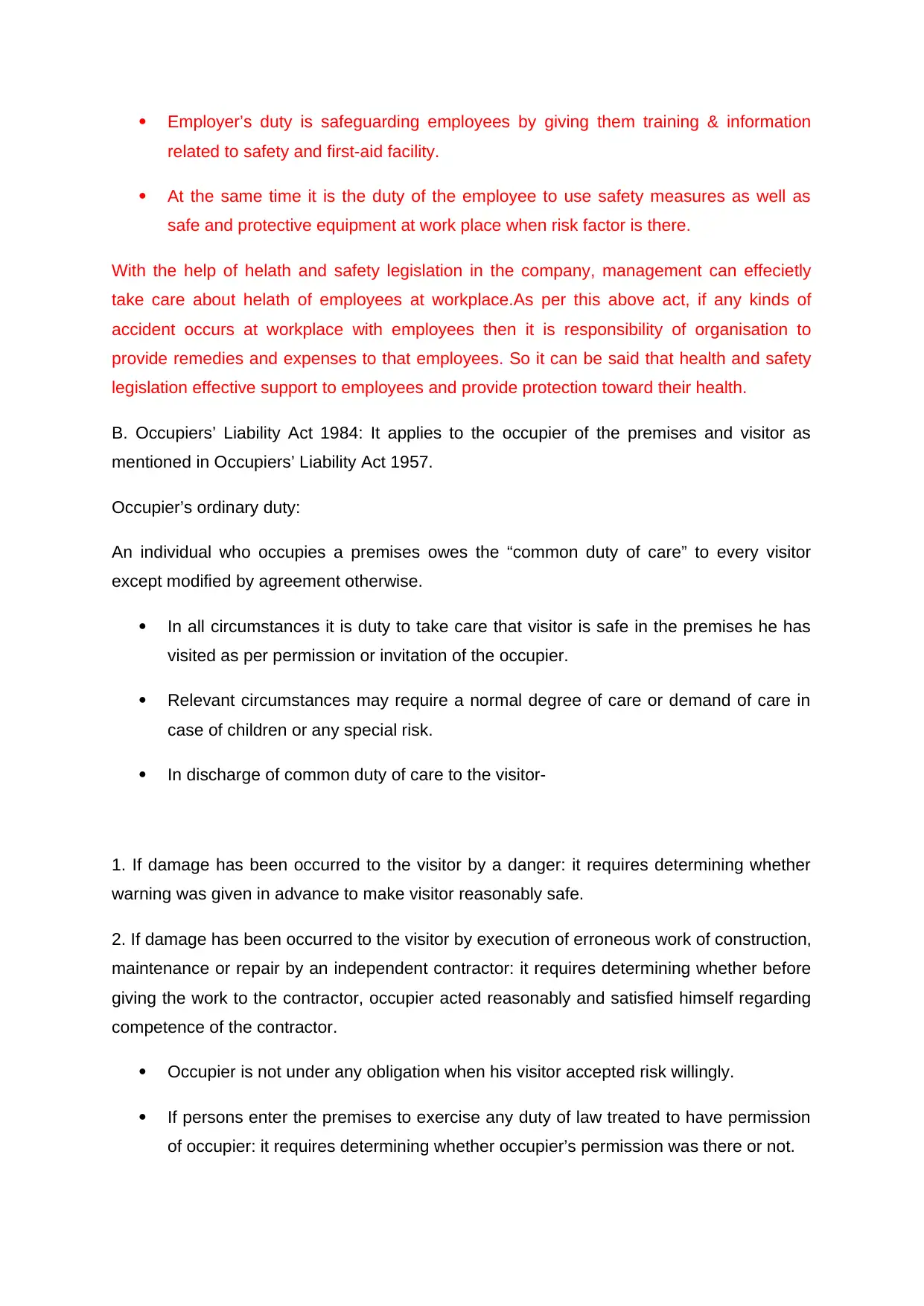
Employer’s duty is safeguarding employees by giving them training & information
related to safety and first-aid facility.
At the same time it is the duty of the employee to use safety measures as well as
safe and protective equipment at work place when risk factor is there.
With the help of helath and safety legislation in the company, management can effecietly
take care about helath of employees at workplace.As per this above act, if any kinds of
accident occurs at workplace with employees then it is responsibility of organisation to
provide remedies and expenses to that employees. So it can be said that health and safety
legislation effective support to employees and provide protection toward their health.
B. Occupiers’ Liability Act 1984: It applies to the occupier of the premises and visitor as
mentioned in Occupiers’ Liability Act 1957.
Occupier’s ordinary duty:
An individual who occupies a premises owes the “common duty of care” to every visitor
except modified by agreement otherwise.
In all circumstances it is duty to take care that visitor is safe in the premises he has
visited as per permission or invitation of the occupier.
Relevant circumstances may require a normal degree of care or demand of care in
case of children or any special risk.
In discharge of common duty of care to the visitor-
1. If damage has been occurred to the visitor by a danger: it requires determining whether
warning was given in advance to make visitor reasonably safe.
2. If damage has been occurred to the visitor by execution of erroneous work of construction,
maintenance or repair by an independent contractor: it requires determining whether before
giving the work to the contractor, occupier acted reasonably and satisfied himself regarding
competence of the contractor.
Occupier is not under any obligation when his visitor accepted risk willingly.
If persons enter the premises to exercise any duty of law treated to have permission
of occupier: it requires determining whether occupier’s permission was there or not.
related to safety and first-aid facility.
At the same time it is the duty of the employee to use safety measures as well as
safe and protective equipment at work place when risk factor is there.
With the help of helath and safety legislation in the company, management can effecietly
take care about helath of employees at workplace.As per this above act, if any kinds of
accident occurs at workplace with employees then it is responsibility of organisation to
provide remedies and expenses to that employees. So it can be said that health and safety
legislation effective support to employees and provide protection toward their health.
B. Occupiers’ Liability Act 1984: It applies to the occupier of the premises and visitor as
mentioned in Occupiers’ Liability Act 1957.
Occupier’s ordinary duty:
An individual who occupies a premises owes the “common duty of care” to every visitor
except modified by agreement otherwise.
In all circumstances it is duty to take care that visitor is safe in the premises he has
visited as per permission or invitation of the occupier.
Relevant circumstances may require a normal degree of care or demand of care in
case of children or any special risk.
In discharge of common duty of care to the visitor-
1. If damage has been occurred to the visitor by a danger: it requires determining whether
warning was given in advance to make visitor reasonably safe.
2. If damage has been occurred to the visitor by execution of erroneous work of construction,
maintenance or repair by an independent contractor: it requires determining whether before
giving the work to the contractor, occupier acted reasonably and satisfied himself regarding
competence of the contractor.
Occupier is not under any obligation when his visitor accepted risk willingly.
If persons enter the premises to exercise any duty of law treated to have permission
of occupier: it requires determining whether occupier’s permission was there or not.
Paraphrase This Document
Need a fresh take? Get an instant paraphrase of this document with our AI Paraphraser
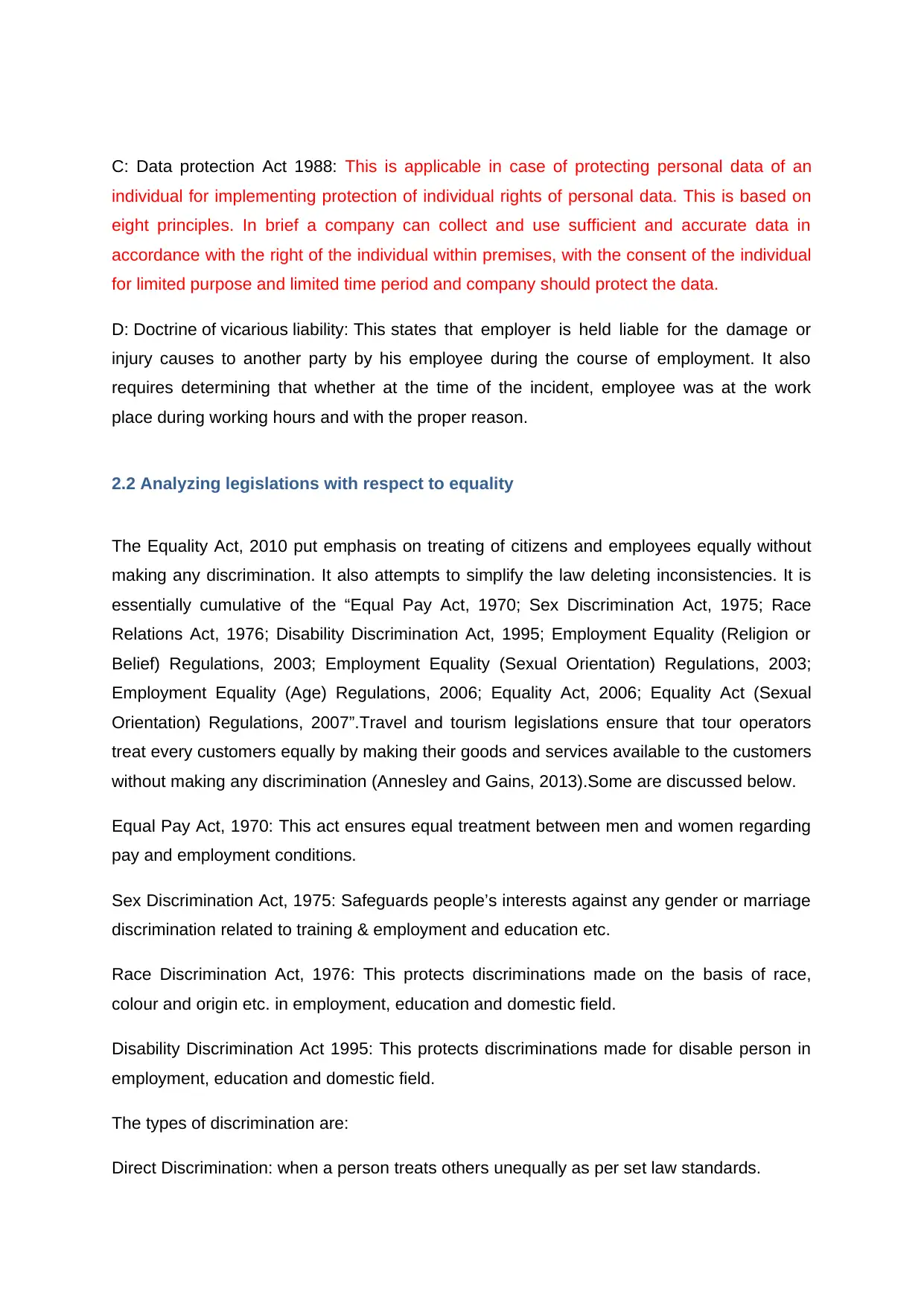
C: Data protection Act 1988: This is applicable in case of protecting personal data of an
individual for implementing protection of individual rights of personal data. This is based on
eight principles. In brief a company can collect and use sufficient and accurate data in
accordance with the right of the individual within premises, with the consent of the individual
for limited purpose and limited time period and company should protect the data.
D: Doctrine of vicarious liability: This states that employer is held liable for the damage or
injury causes to another party by his employee during the course of employment. It also
requires determining that whether at the time of the incident, employee was at the work
place during working hours and with the proper reason.
2.2 Analyzing legislations with respect to equality
The Equality Act, 2010 put emphasis on treating of citizens and employees equally without
making any discrimination. It also attempts to simplify the law deleting inconsistencies. It is
essentially cumulative of the “Equal Pay Act, 1970; Sex Discrimination Act, 1975; Race
Relations Act, 1976; Disability Discrimination Act, 1995; Employment Equality (Religion or
Belief) Regulations, 2003; Employment Equality (Sexual Orientation) Regulations, 2003;
Employment Equality (Age) Regulations, 2006; Equality Act, 2006; Equality Act (Sexual
Orientation) Regulations, 2007”.Travel and tourism legislations ensure that tour operators
treat every customers equally by making their goods and services available to the customers
without making any discrimination (Annesley and Gains, 2013).Some are discussed below.
Equal Pay Act, 1970: This act ensures equal treatment between men and women regarding
pay and employment conditions.
Sex Discrimination Act, 1975: Safeguards people’s interests against any gender or marriage
discrimination related to training & employment and education etc.
Race Discrimination Act, 1976: This protects discriminations made on the basis of race,
colour and origin etc. in employment, education and domestic field.
Disability Discrimination Act 1995: This protects discriminations made for disable person in
employment, education and domestic field.
The types of discrimination are:
Direct Discrimination: when a person treats others unequally as per set law standards.
individual for implementing protection of individual rights of personal data. This is based on
eight principles. In brief a company can collect and use sufficient and accurate data in
accordance with the right of the individual within premises, with the consent of the individual
for limited purpose and limited time period and company should protect the data.
D: Doctrine of vicarious liability: This states that employer is held liable for the damage or
injury causes to another party by his employee during the course of employment. It also
requires determining that whether at the time of the incident, employee was at the work
place during working hours and with the proper reason.
2.2 Analyzing legislations with respect to equality
The Equality Act, 2010 put emphasis on treating of citizens and employees equally without
making any discrimination. It also attempts to simplify the law deleting inconsistencies. It is
essentially cumulative of the “Equal Pay Act, 1970; Sex Discrimination Act, 1975; Race
Relations Act, 1976; Disability Discrimination Act, 1995; Employment Equality (Religion or
Belief) Regulations, 2003; Employment Equality (Sexual Orientation) Regulations, 2003;
Employment Equality (Age) Regulations, 2006; Equality Act, 2006; Equality Act (Sexual
Orientation) Regulations, 2007”.Travel and tourism legislations ensure that tour operators
treat every customers equally by making their goods and services available to the customers
without making any discrimination (Annesley and Gains, 2013).Some are discussed below.
Equal Pay Act, 1970: This act ensures equal treatment between men and women regarding
pay and employment conditions.
Sex Discrimination Act, 1975: Safeguards people’s interests against any gender or marriage
discrimination related to training & employment and education etc.
Race Discrimination Act, 1976: This protects discriminations made on the basis of race,
colour and origin etc. in employment, education and domestic field.
Disability Discrimination Act 1995: This protects discriminations made for disable person in
employment, education and domestic field.
The types of discrimination are:
Direct Discrimination: when a person treats others unequally as per set law standards.
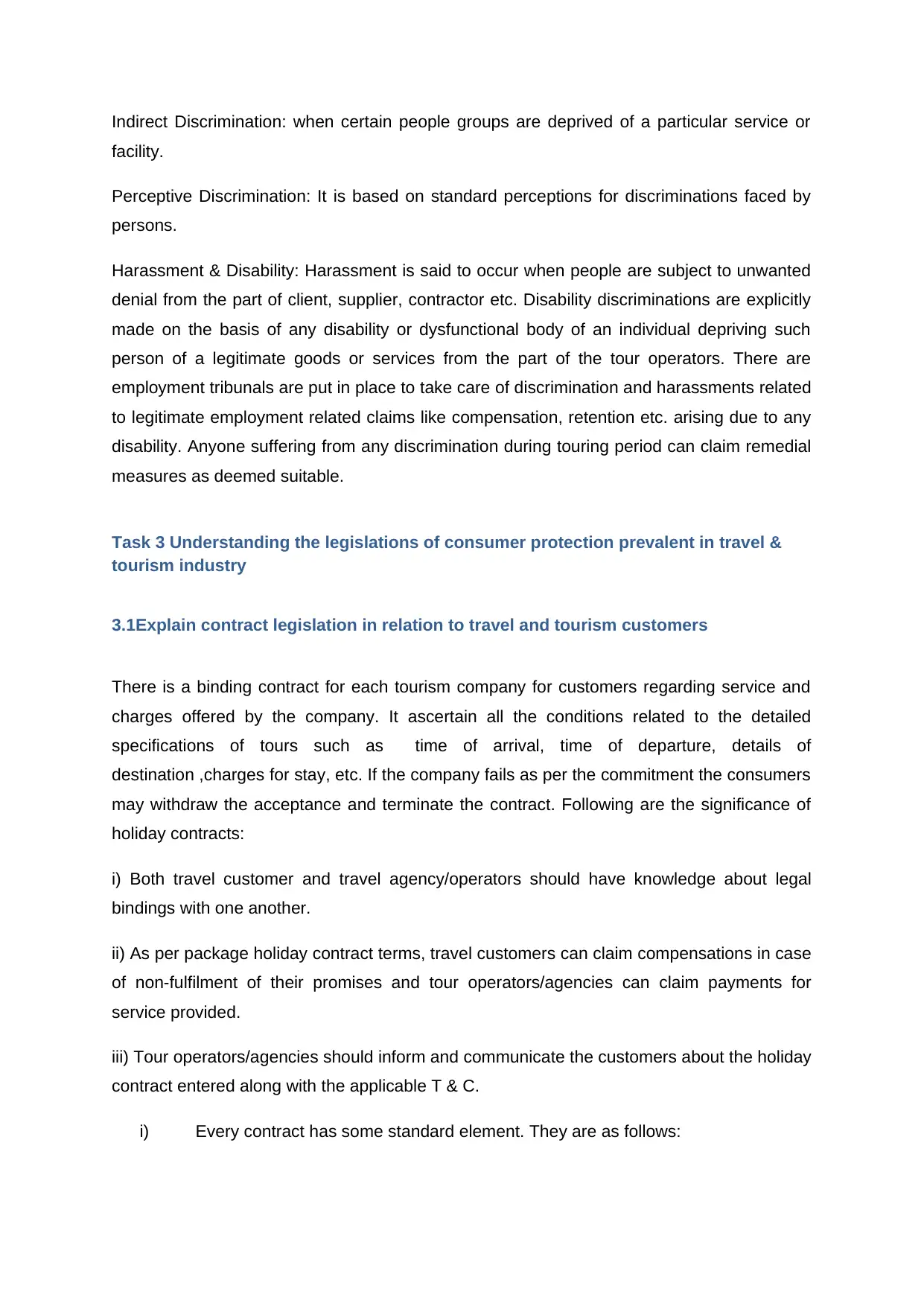
Indirect Discrimination: when certain people groups are deprived of a particular service or
facility.
Perceptive Discrimination: It is based on standard perceptions for discriminations faced by
persons.
Harassment & Disability: Harassment is said to occur when people are subject to unwanted
denial from the part of client, supplier, contractor etc. Disability discriminations are explicitly
made on the basis of any disability or dysfunctional body of an individual depriving such
person of a legitimate goods or services from the part of the tour operators. There are
employment tribunals are put in place to take care of discrimination and harassments related
to legitimate employment related claims like compensation, retention etc. arising due to any
disability. Anyone suffering from any discrimination during touring period can claim remedial
measures as deemed suitable.
Task 3 Understanding the legislations of consumer protection prevalent in travel &
tourism industry
3.1Explain contract legislation in relation to travel and tourism customers
There is a binding contract for each tourism company for customers regarding service and
charges offered by the company. It ascertain all the conditions related to the detailed
specifications of tours such as time of arrival, time of departure, details of
destination ,charges for stay, etc. If the company fails as per the commitment the consumers
may withdraw the acceptance and terminate the contract. Following are the significance of
holiday contracts:
i) Both travel customer and travel agency/operators should have knowledge about legal
bindings with one another.
ii) As per package holiday contract terms, travel customers can claim compensations in case
of non-fulfilment of their promises and tour operators/agencies can claim payments for
service provided.
iii) Tour operators/agencies should inform and communicate the customers about the holiday
contract entered along with the applicable T & C.
i) Every contract has some standard element. They are as follows:
facility.
Perceptive Discrimination: It is based on standard perceptions for discriminations faced by
persons.
Harassment & Disability: Harassment is said to occur when people are subject to unwanted
denial from the part of client, supplier, contractor etc. Disability discriminations are explicitly
made on the basis of any disability or dysfunctional body of an individual depriving such
person of a legitimate goods or services from the part of the tour operators. There are
employment tribunals are put in place to take care of discrimination and harassments related
to legitimate employment related claims like compensation, retention etc. arising due to any
disability. Anyone suffering from any discrimination during touring period can claim remedial
measures as deemed suitable.
Task 3 Understanding the legislations of consumer protection prevalent in travel &
tourism industry
3.1Explain contract legislation in relation to travel and tourism customers
There is a binding contract for each tourism company for customers regarding service and
charges offered by the company. It ascertain all the conditions related to the detailed
specifications of tours such as time of arrival, time of departure, details of
destination ,charges for stay, etc. If the company fails as per the commitment the consumers
may withdraw the acceptance and terminate the contract. Following are the significance of
holiday contracts:
i) Both travel customer and travel agency/operators should have knowledge about legal
bindings with one another.
ii) As per package holiday contract terms, travel customers can claim compensations in case
of non-fulfilment of their promises and tour operators/agencies can claim payments for
service provided.
iii) Tour operators/agencies should inform and communicate the customers about the holiday
contract entered along with the applicable T & C.
i) Every contract has some standard element. They are as follows:
⊘ This is a preview!⊘
Do you want full access?
Subscribe today to unlock all pages.

Trusted by 1+ million students worldwide
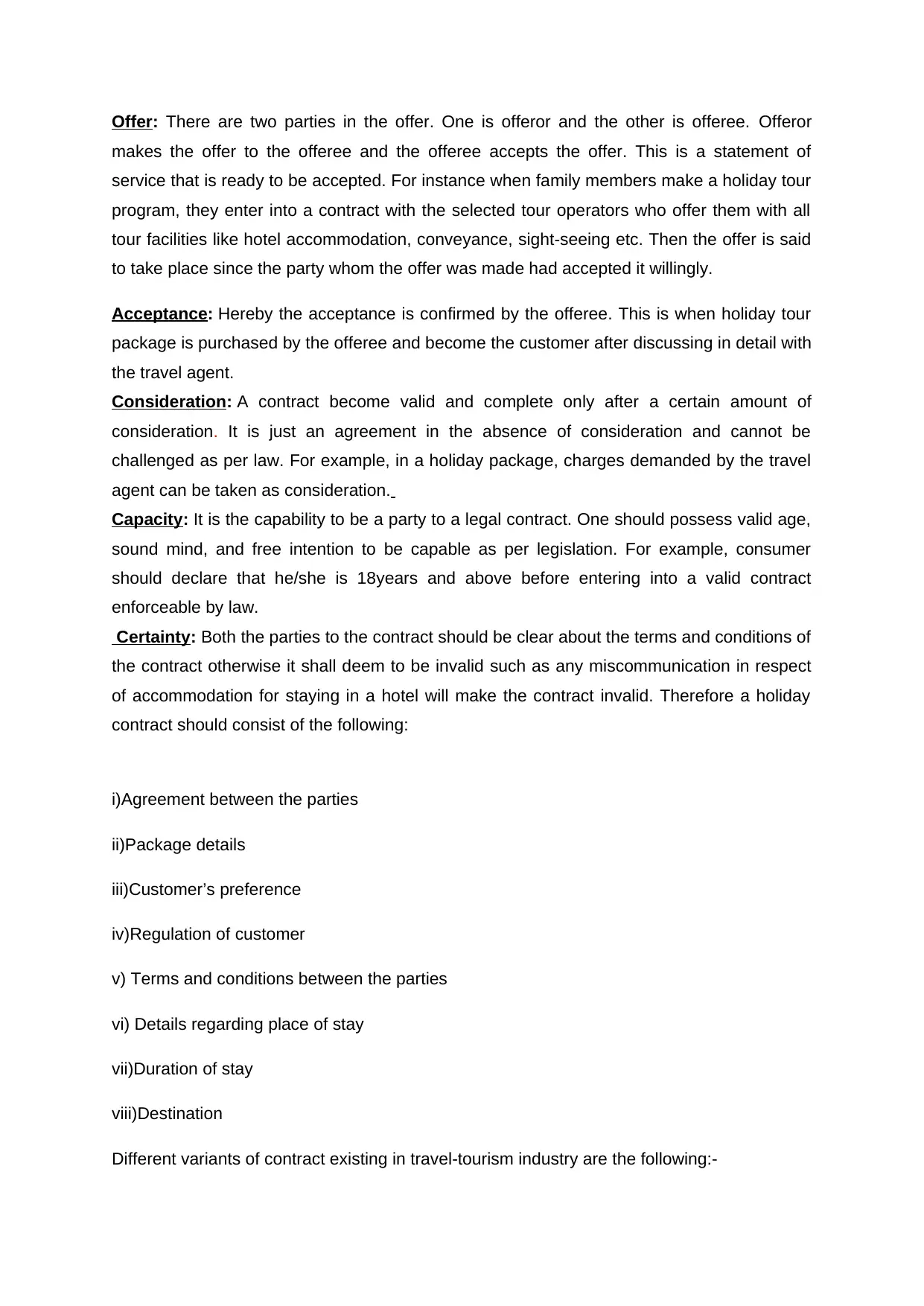
Offer: There are two parties in the offer. One is offeror and the other is offeree. Offeror
makes the offer to the offeree and the offeree accepts the offer. This is a statement of
service that is ready to be accepted. For instance when family members make a holiday tour
program, they enter into a contract with the selected tour operators who offer them with all
tour facilities like hotel accommodation, conveyance, sight-seeing etc. Then the offer is said
to take place since the party whom the offer was made had accepted it willingly.
Acceptance: Hereby the acceptance is confirmed by the offeree. This is when holiday tour
package is purchased by the offeree and become the customer after discussing in detail with
the travel agent.
Consideration: A contract become valid and complete only after a certain amount of
consideration. It is just an agreement in the absence of consideration and cannot be
challenged as per law. For example, in a holiday package, charges demanded by the travel
agent can be taken as consideration.
Capacity: It is the capability to be a party to a legal contract. One should possess valid age,
sound mind, and free intention to be capable as per legislation. For example, consumer
should declare that he/she is 18years and above before entering into a valid contract
enforceable by law.
Certainty: Both the parties to the contract should be clear about the terms and conditions of
the contract otherwise it shall deem to be invalid such as any miscommunication in respect
of accommodation for staying in a hotel will make the contract invalid. Therefore a holiday
contract should consist of the following:
i)Agreement between the parties
ii)Package details
iii)Customer’s preference
iv)Regulation of customer
v) Terms and conditions between the parties
vi) Details regarding place of stay
vii)Duration of stay
viii)Destination
Different variants of contract existing in travel-tourism industry are the following:-
makes the offer to the offeree and the offeree accepts the offer. This is a statement of
service that is ready to be accepted. For instance when family members make a holiday tour
program, they enter into a contract with the selected tour operators who offer them with all
tour facilities like hotel accommodation, conveyance, sight-seeing etc. Then the offer is said
to take place since the party whom the offer was made had accepted it willingly.
Acceptance: Hereby the acceptance is confirmed by the offeree. This is when holiday tour
package is purchased by the offeree and become the customer after discussing in detail with
the travel agent.
Consideration: A contract become valid and complete only after a certain amount of
consideration. It is just an agreement in the absence of consideration and cannot be
challenged as per law. For example, in a holiday package, charges demanded by the travel
agent can be taken as consideration.
Capacity: It is the capability to be a party to a legal contract. One should possess valid age,
sound mind, and free intention to be capable as per legislation. For example, consumer
should declare that he/she is 18years and above before entering into a valid contract
enforceable by law.
Certainty: Both the parties to the contract should be clear about the terms and conditions of
the contract otherwise it shall deem to be invalid such as any miscommunication in respect
of accommodation for staying in a hotel will make the contract invalid. Therefore a holiday
contract should consist of the following:
i)Agreement between the parties
ii)Package details
iii)Customer’s preference
iv)Regulation of customer
v) Terms and conditions between the parties
vi) Details regarding place of stay
vii)Duration of stay
viii)Destination
Different variants of contract existing in travel-tourism industry are the following:-
Paraphrase This Document
Need a fresh take? Get an instant paraphrase of this document with our AI Paraphraser
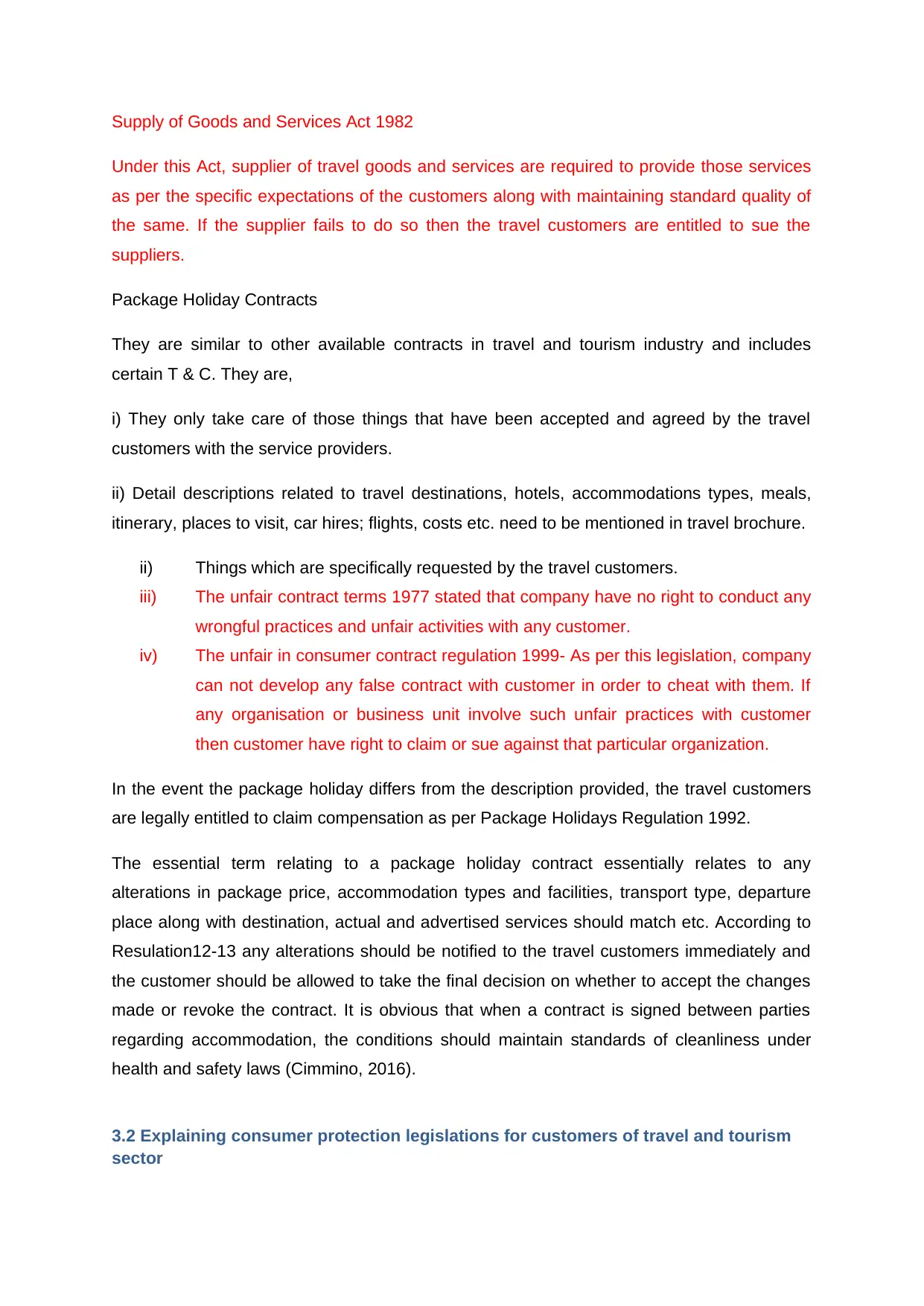
Supply of Goods and Services Act 1982
Under this Act, supplier of travel goods and services are required to provide those services
as per the specific expectations of the customers along with maintaining standard quality of
the same. If the supplier fails to do so then the travel customers are entitled to sue the
suppliers.
Package Holiday Contracts
They are similar to other available contracts in travel and tourism industry and includes
certain T & C. They are,
i) They only take care of those things that have been accepted and agreed by the travel
customers with the service providers.
ii) Detail descriptions related to travel destinations, hotels, accommodations types, meals,
itinerary, places to visit, car hires; flights, costs etc. need to be mentioned in travel brochure.
ii) Things which are specifically requested by the travel customers.
iii) The unfair contract terms 1977 stated that company have no right to conduct any
wrongful practices and unfair activities with any customer.
iv) The unfair in consumer contract regulation 1999- As per this legislation, company
can not develop any false contract with customer in order to cheat with them. If
any organisation or business unit involve such unfair practices with customer
then customer have right to claim or sue against that particular organization.
In the event the package holiday differs from the description provided, the travel customers
are legally entitled to claim compensation as per Package Holidays Regulation 1992.
The essential term relating to a package holiday contract essentially relates to any
alterations in package price, accommodation types and facilities, transport type, departure
place along with destination, actual and advertised services should match etc. According to
Resulation12-13 any alterations should be notified to the travel customers immediately and
the customer should be allowed to take the final decision on whether to accept the changes
made or revoke the contract. It is obvious that when a contract is signed between parties
regarding accommodation, the conditions should maintain standards of cleanliness under
health and safety laws (Cimmino, 2016).
3.2 Explaining consumer protection legislations for customers of travel and tourism
sector
Under this Act, supplier of travel goods and services are required to provide those services
as per the specific expectations of the customers along with maintaining standard quality of
the same. If the supplier fails to do so then the travel customers are entitled to sue the
suppliers.
Package Holiday Contracts
They are similar to other available contracts in travel and tourism industry and includes
certain T & C. They are,
i) They only take care of those things that have been accepted and agreed by the travel
customers with the service providers.
ii) Detail descriptions related to travel destinations, hotels, accommodations types, meals,
itinerary, places to visit, car hires; flights, costs etc. need to be mentioned in travel brochure.
ii) Things which are specifically requested by the travel customers.
iii) The unfair contract terms 1977 stated that company have no right to conduct any
wrongful practices and unfair activities with any customer.
iv) The unfair in consumer contract regulation 1999- As per this legislation, company
can not develop any false contract with customer in order to cheat with them. If
any organisation or business unit involve such unfair practices with customer
then customer have right to claim or sue against that particular organization.
In the event the package holiday differs from the description provided, the travel customers
are legally entitled to claim compensation as per Package Holidays Regulation 1992.
The essential term relating to a package holiday contract essentially relates to any
alterations in package price, accommodation types and facilities, transport type, departure
place along with destination, actual and advertised services should match etc. According to
Resulation12-13 any alterations should be notified to the travel customers immediately and
the customer should be allowed to take the final decision on whether to accept the changes
made or revoke the contract. It is obvious that when a contract is signed between parties
regarding accommodation, the conditions should maintain standards of cleanliness under
health and safety laws (Cimmino, 2016).
3.2 Explaining consumer protection legislations for customers of travel and tourism
sector
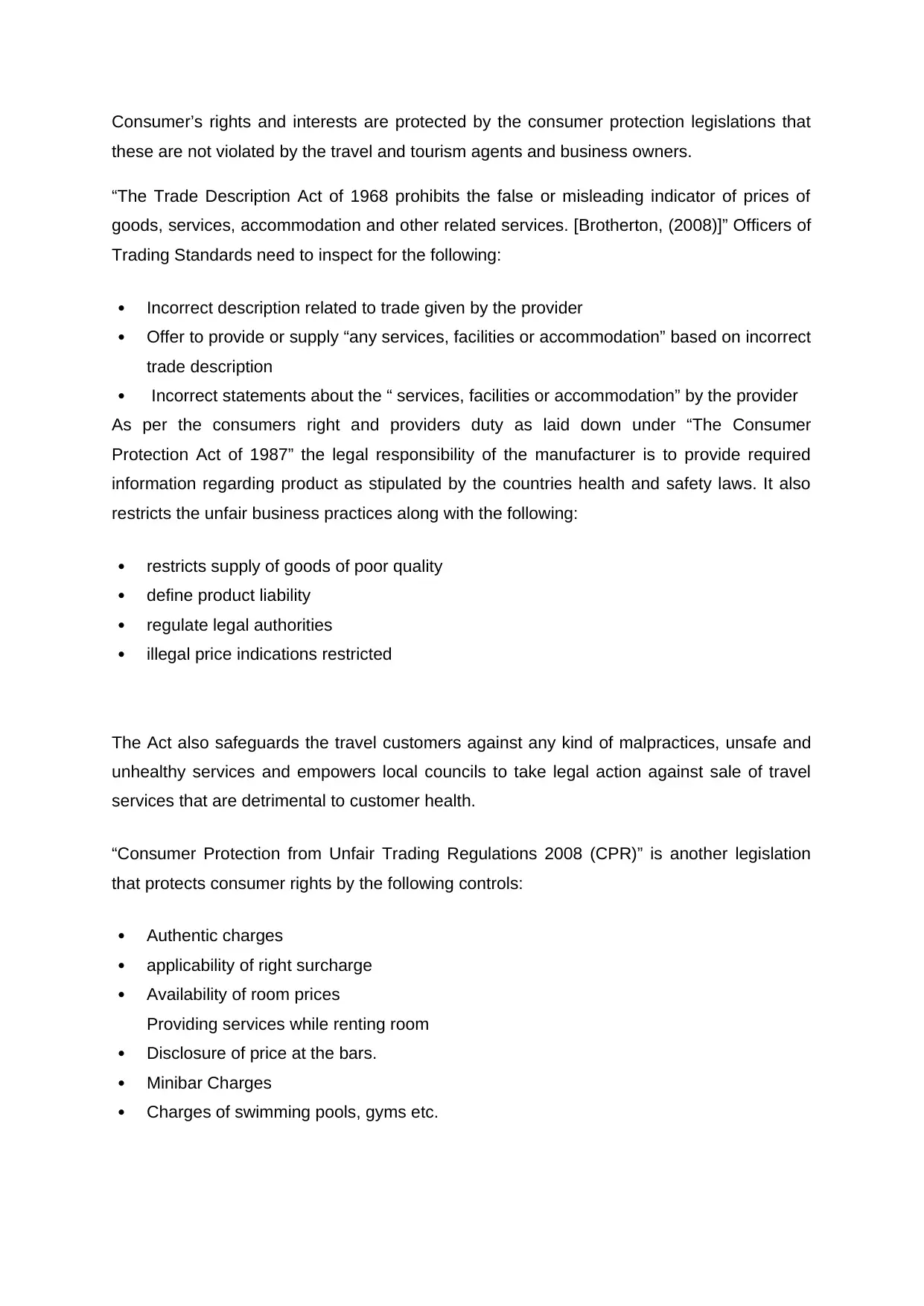
Consumer’s rights and interests are protected by the consumer protection legislations that
these are not violated by the travel and tourism agents and business owners.
“The Trade Description Act of 1968 prohibits the false or misleading indicator of prices of
goods, services, accommodation and other related services. [Brotherton, (2008)]” Officers of
Trading Standards need to inspect for the following:
Incorrect description related to trade given by the provider
Offer to provide or supply “any services, facilities or accommodation” based on incorrect
trade description
Incorrect statements about the “ services, facilities or accommodation” by the provider
As per the consumers right and providers duty as laid down under “The Consumer
Protection Act of 1987” the legal responsibility of the manufacturer is to provide required
information regarding product as stipulated by the countries health and safety laws. It also
restricts the unfair business practices along with the following:
restricts supply of goods of poor quality
define product liability
regulate legal authorities
illegal price indications restricted
The Act also safeguards the travel customers against any kind of malpractices, unsafe and
unhealthy services and empowers local councils to take legal action against sale of travel
services that are detrimental to customer health.
“Consumer Protection from Unfair Trading Regulations 2008 (CPR)” is another legislation
that protects consumer rights by the following controls:
Authentic charges
applicability of right surcharge
Availability of room prices
Providing services while renting room
Disclosure of price at the bars.
Minibar Charges
Charges of swimming pools, gyms etc.
these are not violated by the travel and tourism agents and business owners.
“The Trade Description Act of 1968 prohibits the false or misleading indicator of prices of
goods, services, accommodation and other related services. [Brotherton, (2008)]” Officers of
Trading Standards need to inspect for the following:
Incorrect description related to trade given by the provider
Offer to provide or supply “any services, facilities or accommodation” based on incorrect
trade description
Incorrect statements about the “ services, facilities or accommodation” by the provider
As per the consumers right and providers duty as laid down under “The Consumer
Protection Act of 1987” the legal responsibility of the manufacturer is to provide required
information regarding product as stipulated by the countries health and safety laws. It also
restricts the unfair business practices along with the following:
restricts supply of goods of poor quality
define product liability
regulate legal authorities
illegal price indications restricted
The Act also safeguards the travel customers against any kind of malpractices, unsafe and
unhealthy services and empowers local councils to take legal action against sale of travel
services that are detrimental to customer health.
“Consumer Protection from Unfair Trading Regulations 2008 (CPR)” is another legislation
that protects consumer rights by the following controls:
Authentic charges
applicability of right surcharge
Availability of room prices
Providing services while renting room
Disclosure of price at the bars.
Minibar Charges
Charges of swimming pools, gyms etc.
⊘ This is a preview!⊘
Do you want full access?
Subscribe today to unlock all pages.

Trusted by 1+ million students worldwide
1 out of 18
Related Documents
Your All-in-One AI-Powered Toolkit for Academic Success.
+13062052269
info@desklib.com
Available 24*7 on WhatsApp / Email
![[object Object]](/_next/static/media/star-bottom.7253800d.svg)
Unlock your academic potential
Copyright © 2020–2025 A2Z Services. All Rights Reserved. Developed and managed by ZUCOL.


